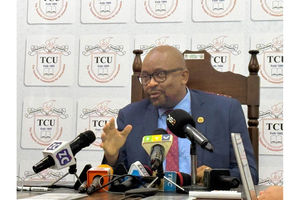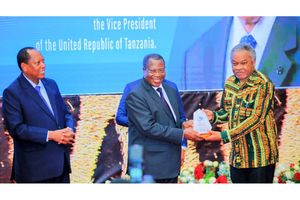TBS should use its teeth to protect Tanzanians

Director General of Tanzania Bureau of Standards (TBS),Professor Egid Mubofu
What you need to know:
- As local production falls short of international standards, the country is forced to export goods in raw form. It, therefore, loses out on huge revenues that come with finished products.
The problems the Tanzania Bureau of Standards (TBS) faces highlight Tanzania’s challenges as it attempts to break into the regional and global markets as an exporter of high quality goods and services.
As local production falls short of international standards, the country is forced to export goods in raw form. It, therefore, loses out on huge revenues that come with finished products.
The government’s lack of seriousness on quality matters is the reason why most of the goods that are sold in the country are counterfeits. As we continue to turn a blind eye to this issue, cheap foreign products—especially from Asian countries—continue to flood our markets. This can only cripple local industries and cause untold losses to consumers. Sometimes these losses come in the form of death or devastating diseases.
The laxity in enforcing standards is evident in almost all sectors, including public transport where daladala seats are fixed without any regard for passenger comfort and convenience. They are there simply there as evidence that bus owners are complying with traffic rules. When accidents occur, though, it is these “small” issues that make the difference between life and death.
The problem with TBS is also manifest in the fact that those who flout the rules standards often walk free. The government needs to put in place strict policies that will ensure compliance with quality and quantity standards. These policies should include hefty fines and prison terms for offenders.
It is also upon all Tanzanians to learn to appreciate quality. Our country has become a dumping ground for sub-standard goods because these items have a ready market locally. Let’s learn to say no to poor quality goods and services.
When all is said and done, it is TBS that has the mandate to protect Tanzanians from local and foreign producers who have no regard for acceptable standards.
EXPEDITE VARSITIES VETTING
August was a very crucial time for Tanzanians waiting to join higher education. It was the month during which prospective students sent applications to various universities as well as the Higher Education Students Loans Board.
However, in July the Tanzania Commission for Universities (TCU) blacklisted 19 universities from taking in new students in the new academic year.
TCU acting executive secretary Eliuther Mwangeni said in a statement then that the decision followed an inspection it conducted in September and October of last year.
The decision came as a shock to the universities and prospective students alike. It was a bolt out of the blue.
According to the commission’s admission director, Dr Kokuberwa Mollel, the body has already received reports on the universities and will assess them before a decision is made on whether to lift or maintain the ban.
While we do not condone poor quality, we would like to urge the commission to expedite its assessment of the affected universities and make a decision as soon as possible to allow interested students to make applications and make the necessary follow-up.
TCU, which is tasked with monitoring quality of education offered in institutions of higher learning, should ensure that it devises a mechanism that will ensure sustained quality control.
Constant monitoring of quality will help in early detection of problems for action to be taken immediately.




